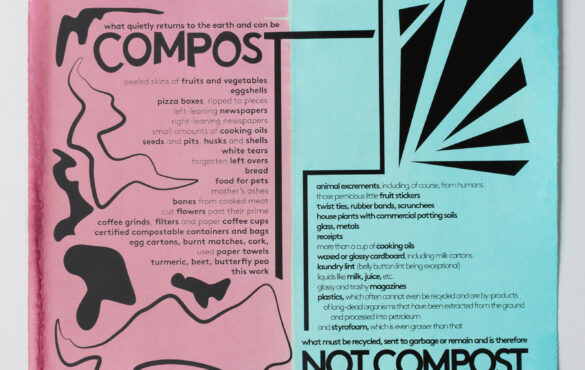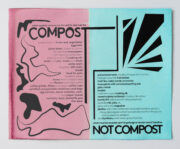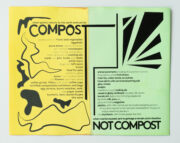Latham Zearfoss
Many Happy Returns is part of a larger project, stems, by artist Latham Zearfoss.
Each print is dyed with a natural pigment on the left side, corresponding to a list of things that can be composted. The right side of each print is dyed with a synthetic dye, and corresponds to materials that are not typically composable. The text doubles as both a functional resource list and a poem that meditates on the act of enriching soil with organic waste. This broadside, which is itself compostable, illustrates the ways in which consumption and production are interdependent and always in flux.
Many Happy Returns has been created in two different colorways. The yellow and green broadsides are dyed with turmeric tea on the left side of the paper. The pink and blue broadsides are dyed with beet juice on the left side of the paper. The right sides of both prints are dyed with a synthetic Jacquard ink.
Zearfoss also created a small edition of handmade paper pots, dyed with the same natural pigments as the posters, that housed sunflower seedlings and were ultimately intended to be planted in the ground. These were part of a virtual installation that also included a flickering neon sign and a musical score composed of field recordings from Zearfoss’s creaky South Side home and arranged in the cadence of Chicago’s house music. Sunflowers remediate soil, and for many, house music remediates the soul. These regenerative forms offer up a casual transcendentalism, and anchor stems in the space of meditative communion: on death and rebirth, human and non-human life.
Man Happy Returns, and the stems project, come out of the artist’s own agnostic spiritual journey. Borrowing from Mark Aguhar’s These Are The Axes, Zearfoss wanted to locate an authentic ritual comfort, one that would allow him to “remember death” while grieving with hope; essentially honor the dead as well as the living. Composting is an eternal cycle of transformation, wherein mortality is reckoned with as a vital moment of possibility for the self, the collective, the past, and the future. While this work comes after the loss of Zearfoss’s mother to cancer in early 2020, it is also extrapolating political possibilities from the process of grieving, asking: what must we let die so that other ways and beings might live and thrive? Through Many Happy Returns, Zearfoss states, “I wanted to give a spiritual dimension to the transformations and sunsetting of our institutions in these interwoven racial, environmental and social reckonings. Perhaps it’s just a simple suggestion. Decompose, recompose.”
Latham Zearfoss works in Chicago, where they produce time-based images, objects and experiences about selfhood and otherness. Outside of the studio, they contribute to collective motions toward joy and reflection through social projects such as a queer dance party (Chances Dances), a critical space for white allyship (Make Yourself Useful), and an itinerant conference on socially-engaged art (Open Engagement). Latham graduated from The School of the Art Institute of Chicago with a BFA in 2008 and the University of Illinois at Chicago with an MFA in 2011. They have exhibited their work, screened their videos, and DJed internationally and all over the U.S.


